Potential Causes of Unexplained Health Symptoms
Are Parasites, Fungi, or Bacteria The Reason for Your Chronic Health Problems and Unexplained Symptoms?
If you’ve ever experienced ongoing health issues that just won’t go away, you know how frustrating it can be to search for answers.
Countless doctor visits, numerous tests, thousands of dollars spent, and still, no relief.
You may feel dismissed or unheard, but we hear you, and we empathize with your frustration.
If you’ve explored all other avenues, it may be time to look at this through a whole new lens and consider an alternative explanation for your mysterious symptoms — the possibility of gut invaders.
Yes, we’re talking about parasites, fungi, and bacteria that might have taken up residence in your gut, causing havoc and leading to a host of troubling symptoms.
While it’s relatively rare, it’s definitely worth exploring this possibility if you’ve been struggling to find a diagnosis.
Let’s dive into the world of gut invaders and see how they might be affecting your health.
Parasite Symptoms Quiz
Are Gut Invaders Behind Your Unexplained Symptoms?
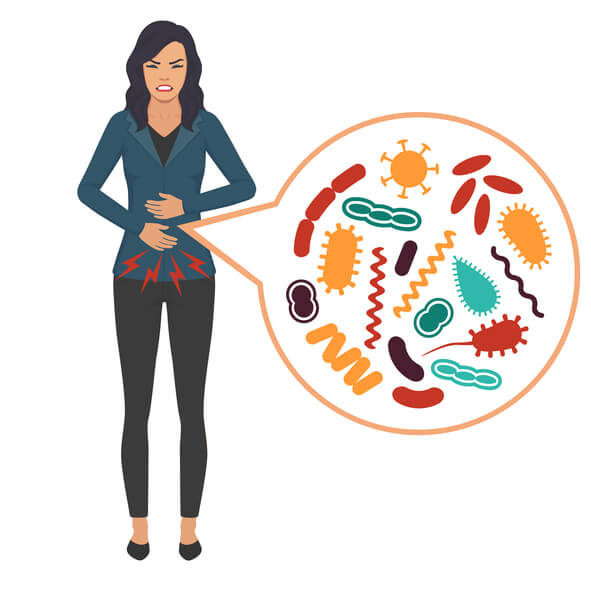
Gut invaders are sneaky creatures, often flying under the radar with their symptoms mirroring or mimicking other health issues.
Here are 14 signs that could indicate you have unwelcome guests in your gut:
- Chronic diarrhea
- Chronic exhaustion & fatigue
- Sudden, unexplained weight loss or gain
- Abdominal pain & cramping
- Insomnia
- Asthma
- Skin rashes/itchy skin
- Itching around the anus
- Bloody stool
- A never-ending hunger
- Loss of appetite
- Food allergies
- Ulcers
- Cravings for certain types of foods
You must remember that these symptoms can also be caused by various other factors and health conditions. So, it’s crucial to undergo proper testing to identify the root cause of your issues.
Types of Parasites, Fungi, or Bacteria That Can Cause Symptoms
Let’s take a closer look at the different types of gut invaders that might be responsible for the symptoms mentioned above:
Parasites
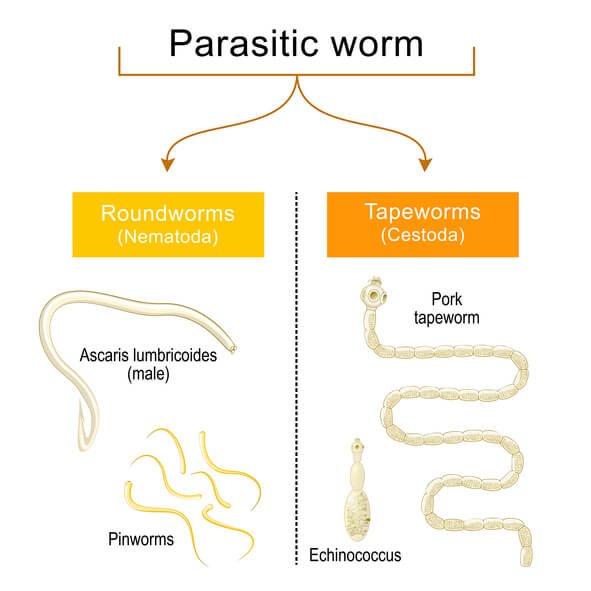
Parasites come in various shapes and sizes and can wreak havoc on your health.
Some common gut-invading parasites include:
- Tapeworms
- Pinworms
- Ascaris
- Hookworms
- Intestinal trematodes
- Entamoeba histolytica
Fungi
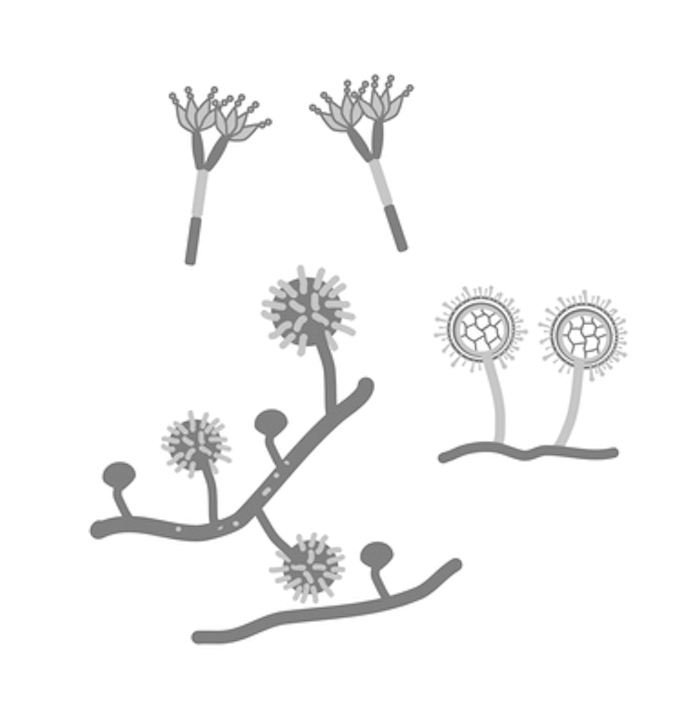
Fungi, particularly yeast, can also lead to significant health issues.
Keep an eye out for these common fungi:
- Candida
- Common yeast
- Geotrichum
- Kloeckeri
- Hyphae
Bacteria

Bacteria are notorious for causing infections in humans.
Some of these common bacteria strains might be responsible for your symptoms:
- Salmonella
- E.coli
- Klebsiella
- Shigella
- Vibrio cholera
- Citrobacter Freundii
- Proteus Vulgaris
- Yersinia
- Campylobacter
- Clostridium difficile
- Helicobacter pylori
Deciding When to Get Tested
If you’ve been dealing with persistent, unexplained symptoms, it might be time to consider testing for parasites, fungi, or bacteria.
But who should get tested?
Well, anyone experiencing these chronic health issues should explore the possibility:
- Chronic diarrhea
- Ongoing fatigue
- Unexplained weight changes
- Abdominal pain
- Sleep troubles
- Recurring respiratory problems
- Skin issues
- Itching around the anus
- Blood in your stool
- Constant hunger or loss of appetite
- Frequent food allergies or intolerances
- Ulcers that won’t heal
- Cravings for specific foods
Consulting with a healthcare professional experienced in infectious diseases or a specialist who can conduct relevant diagnostic tests is a wise step toward identifying and addressing these issues.
For those interested in testing for parasites, bacteria, and fungi from the comfort and privacy of your own home, we recommend the 48 Gut Invaders home test kit.
Can People Catch Parasites in the USA?
You might assume parasite infections only occur in developing countries or exotic locations, but that’s not entirely true.
Certain parasites can be contracted from contaminated water sources right here in the USA. Two notorious culprits are Cryptosporidium and Giardia, which can cause gastrointestinal distress.
It’s crucial to know that gut invaders don’t discriminate based on geography.
They can be found worldwide, and you don’t have to travel to a distant land to encounter them. In fact, some of the most common parasites, fungi, and bacteria can be found in everyday environments, like playgrounds, public restrooms, and even your own home.
Top 10 Hygiene Tips to Prevent Gut Invaders
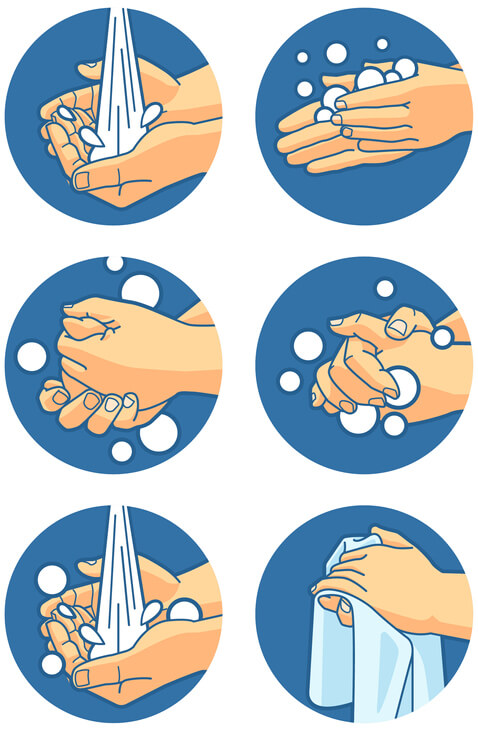
- Wash your hands regularly: This bears repeating, as handwashing is one of the most effective ways to prevent the spread of gut invaders. Teach your family and children proper handwashing techniques, and make it a habit to wash hands before eating, after using the restroom, and after being in public places.
- Avoid raw or undercooked foods: While some cuisines include raw dishes, consuming raw or undercooked meats, fish, or eggs can increase the risk of gut invaders. Ensure that meats are thoroughly cooked to safe temperatures, and consider avoiding raw or undercooked foods while traveling or in areas with limited sanitation.
- Be cautious with pets and animals: We love our furry friends, but it’s essential to be mindful of potential parasite transmission. Wash your hands after handling pets, especially before eating. Dispose of pet waste properly to avoid contaminating the environment.
- Use insect repellents: Insects, like mosquitoes and ticks, can carry and transmit parasites. When spending time outdoors, especially in wooded or tropical areas, use insect repellents containing DEET or other recommended ingredients. Wear long-sleeved clothing and pants to minimize exposure to insects.
- Maintain a clean living environment: Regularly clean and disinfect your living spaces, paying attention to areas where food is prepared and consumed. Minimize clutter and practice good sanitation to reduce the risk of attracting pests that could carry gut invaders.
- Be cautious with water activities: If you enjoy water sports or activities, be aware of potential parasite risks. Avoid swallowing water while swimming, and consider using nose clips to prevent water from entering your nose, reducing the risk of contracting certain parasites.
- Practice safe sex: Some parasites and sexually transmitted infections can be transmitted through sexual contact. Use protection, such as condoms, to reduce the risk of transmission.
- Avoid sharing personal items: Sharing personal items, such as towels, razors, or toothbrushes, can facilitate the spread of gut invaders. Keep your personal items to yourself, and encourage others to do the same.
- Be cautious while traveling: When traveling to regions with a higher prevalence of gut invaders, take extra precautions. Drink bottled or boiled water, avoid street food, and be mindful of food hygiene practices.
- Boost your immune system: A strong immune system can help protect you from gut invaders and other infections. Get enough sleep, maintain a healthy diet rich in fruits and vegetables, exercise regularly, and manage stress to support your immune system’s function.
Empower Yourself to Find Answers
With these additional hygiene tips, you are better equipped to prevent and address potential gut invaders. While these infections are relatively rare, they are worth considering if you’ve been experiencing unexplained symptoms.
Empower yourself by maintaining good hygiene, being proactive in seeking the right tests, and consulting with knowledgeable healthcare professionals.
Maintain open communication with your healthcare providers, stay vigilant about your health, and explore all possibilities until you uncover the underlying cause of your symptoms.
For an easy, accurate DIY option, consider our 48 Gut Invaders home test kit – a comprehensive at-home test that checks for 31 parasites, 5 fungi (candida), 12 gut bacteria, and 11 other markers of digestive health.
Why the 48 Gut Invaders Home Test Kit?
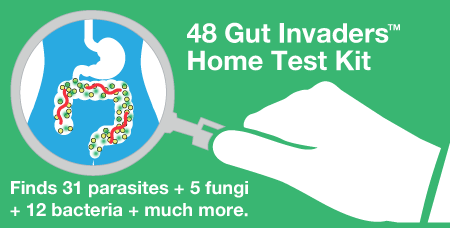
- Comprehensive – Tests for 48 “Gut Invaders”
- Easy Home test – No embarrassing trips to a lab
- Accurate – Results analyzed by Ph.D. parasitologists
- Pre-test preparation to maximize accuracy
- Free post-test coaching to help plan your next steps
- 4 days of stool samples – find 2.753 more parasites than a single stool X as accurate as 1 sample
- Specialized preservation fluids preserve ALL signs of parasites
- High contrast dyes find parasite eggs 100x smaller than a human hair
Remember, you are not alone in this journey, and finding the right diagnosis can be life-changing. By taking charge of your health and remaining persistent, you can pave the way for a healthier and happier future.
Together, we can uncover the hidden sources of your chronic health problems and bring you closer to the answers you seek.
